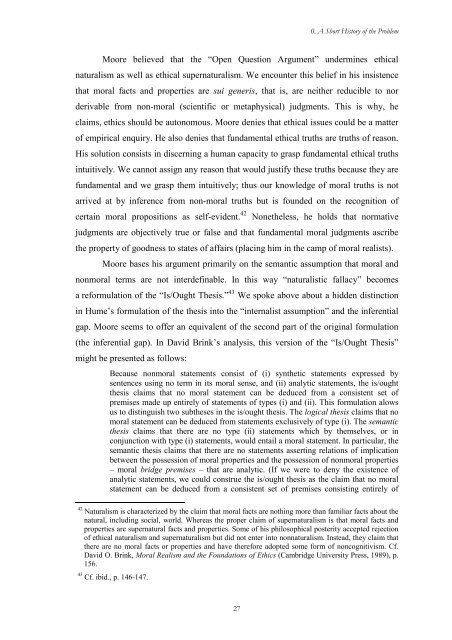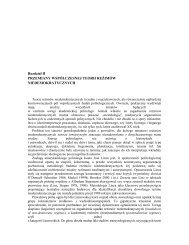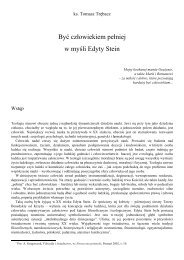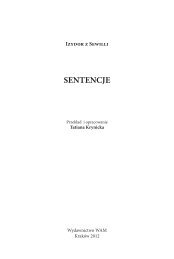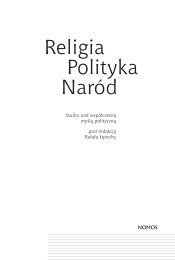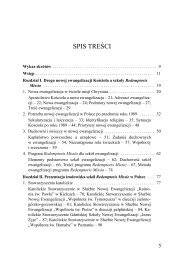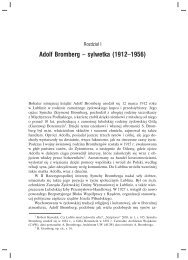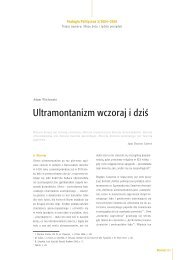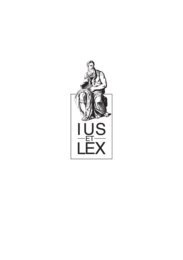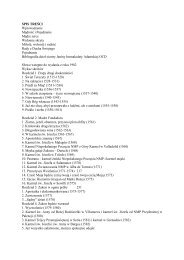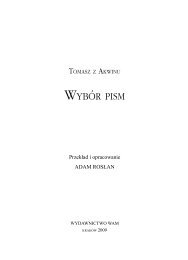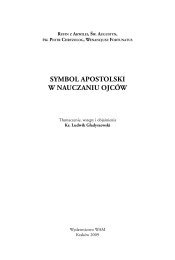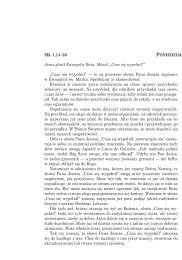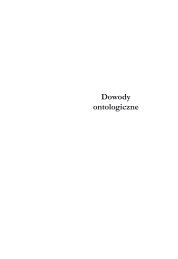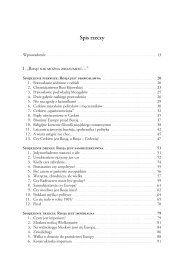Did St. Thomas Aquinas Justify the Transition from 'Is' to 'Ought'
Did St. Thomas Aquinas Justify the Transition from 'Is' to 'Ought'
Did St. Thomas Aquinas Justify the Transition from 'Is' to 'Ought'
You also want an ePaper? Increase the reach of your titles
YUMPU automatically turns print PDFs into web optimized ePapers that Google loves.
27<br />
0. A Short His<strong>to</strong>ry of <strong>the</strong> Problem<br />
Moore believed that <strong>the</strong> “Open Question Argument” undermines ethical<br />
naturalism as well as ethical supernaturalism. We encounter this belief in his insistence<br />
that moral facts and properties are sui generis, that is, are nei<strong>the</strong>r reducible <strong>to</strong> nor<br />
derivable <strong>from</strong> non-moral (scientific or metaphysical) judgments. This is why, he<br />
claims, ethics should be au<strong>to</strong>nomous. Moore denies that ethical issues could be a matter<br />
of empirical enquiry. He also denies that fundamental ethical truths are truths of reason.<br />
His solution consists in discerning a human capacity <strong>to</strong> grasp fundamental ethical truths<br />
intuitively. We cannot assign any reason that would justify <strong>the</strong>se truths because <strong>the</strong>y are<br />
fundamental and we grasp <strong>the</strong>m intuitively; thus our knowledge of moral truths is not<br />
arrived at by inference <strong>from</strong> non-moral truths but is founded on <strong>the</strong> recognition of<br />
certain moral propositions as self-evident. 42 None<strong>the</strong>less, he holds that normative<br />
judgments are objectively true or false and that fundamental moral judgments ascribe<br />
<strong>the</strong> property of goodness <strong>to</strong> states of affairs (placing him in <strong>the</strong> camp of moral realists).<br />
Moore bases his argument primarily on <strong>the</strong> semantic assumption that moral and<br />
nonmoral terms are not interdefinable. In this way “naturalistic fallacy” becomes<br />
a reformulation of <strong>the</strong> “Is/Ought Thesis.” 43 We spoke above about a hidden distinction<br />
in Hume’s formulation of <strong>the</strong> <strong>the</strong>sis in<strong>to</strong> <strong>the</strong> “internalist assumption” and <strong>the</strong> inferential<br />
gap. Moore seems <strong>to</strong> offer an equivalent of <strong>the</strong> second part of <strong>the</strong> original formulation<br />
(<strong>the</strong> inferential gap). In David Brink’s analysis, this version of <strong>the</strong> “Is/Ought Thesis”<br />
might be presented as follows:<br />
Because nonmoral statements consist of (i) syn<strong>the</strong>tic statements expressed by<br />
sentences using no term in its moral sense, and (ii) analytic statements, <strong>the</strong> is/ought<br />
<strong>the</strong>sis claims that no moral statement can be deduced <strong>from</strong> a consistent set of<br />
premises made up entirely of statements of types (i) and (ii). This formulation alows<br />
us <strong>to</strong> distinguish two sub<strong>the</strong>ses in <strong>the</strong> is/ought <strong>the</strong>sis. The logical <strong>the</strong>sis claims that no<br />
moral statement can be deduced <strong>from</strong> statements exclusively of type (i). The semantic<br />
<strong>the</strong>sis claims that <strong>the</strong>re are no type (ii) statements which by <strong>the</strong>mselves, or in<br />
conjunction with type (i) statements, would entail a moral statement. In particular, <strong>the</strong><br />
semantic <strong>the</strong>sis claims that <strong>the</strong>re are no statements asserting relations of implication<br />
between <strong>the</strong> possession of moral properties and <strong>the</strong> possession of nonmoral properties<br />
– moral bridge premises – that are analytic. (If we were <strong>to</strong> deny <strong>the</strong> existence of<br />
analytic statements, we could construe <strong>the</strong> is/ought <strong>the</strong>sis as <strong>the</strong> claim that no moral<br />
statement can be deduced <strong>from</strong> a consistent set of premises consisting entirely of<br />
42 Naturalism is characterized by <strong>the</strong> claim that moral facts are nothing more than familiar facts about <strong>the</strong><br />
natural, including social, world. Whereas <strong>the</strong> proper claim of supernaturalism is that moral facts and<br />
properties are supernatural facts and properties. Some of his philosophical posterity accepted rejection<br />
of ethical naturalism and supernaturalism but did not enter in<strong>to</strong> nonnaturalism. Instead, <strong>the</strong>y claim that<br />
<strong>the</strong>re are no moral facts or properties and have <strong>the</strong>refore adopted some form of noncognitivism. Cf.<br />
David O. Brink, Moral Realism and <strong>the</strong> Foundations of Ethics (Cambridge University Press, 1989), p.<br />
156.<br />
43 Cf. ibid., p. 146-147.


